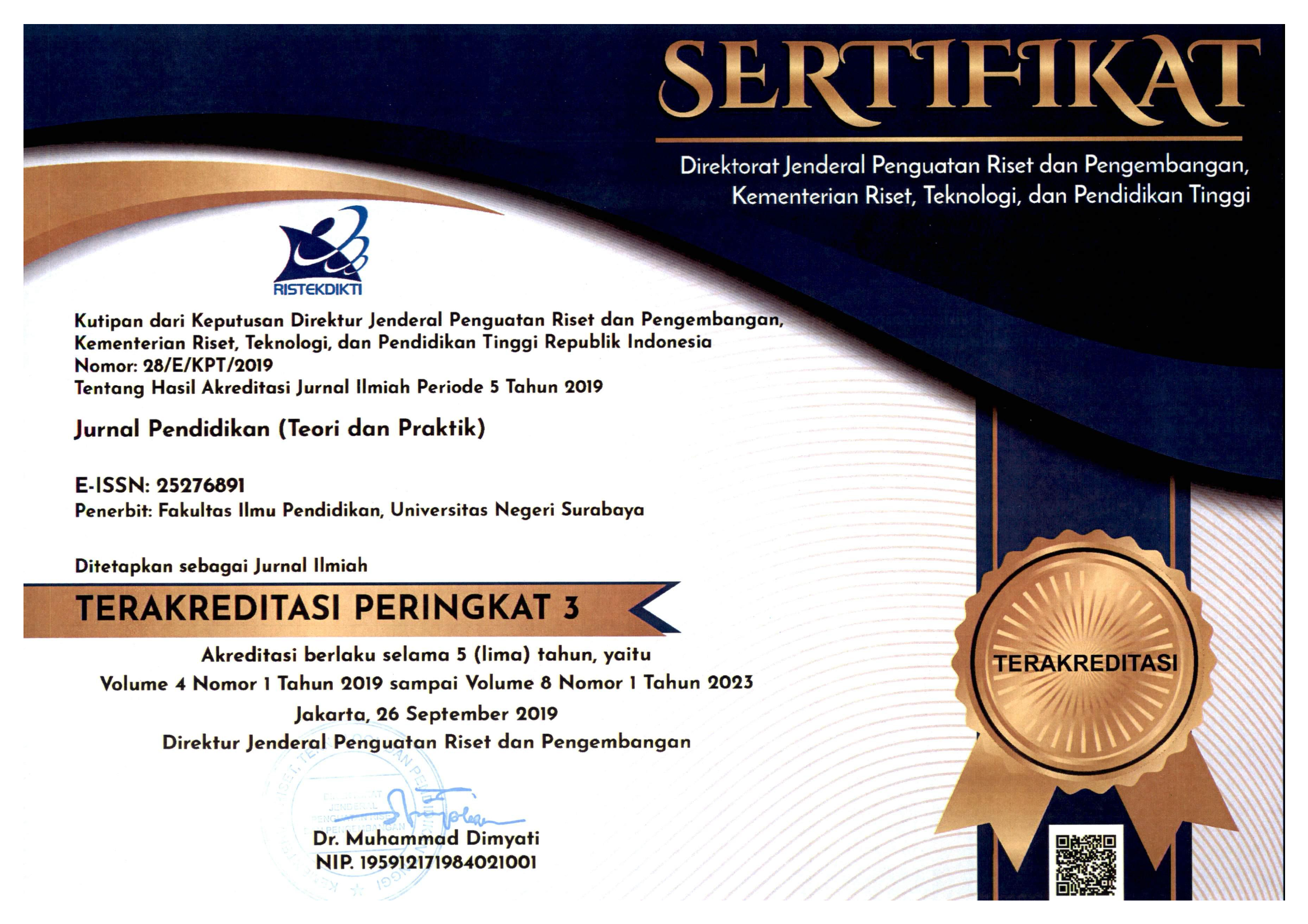Filosofi Ilmu Bimbingan Dan Konseling Indonesia
DOI:
https://doi.org/10.26740/jp.v2n1.p1-11Keywords:
filosofi keilmuan, bimbingan, konselingAbstract
Abstrak
Ilmu Bimbingan dan Konseling adalah ilmu pengetahuan yang mandiri berakar pada filsafat dan agama. Perkembangan Ilmu Bimbingan dan Konseling dari filsafat Bimbingan dan Konseling yang didukung oleh ilmu pendidikan, psikologi, sosiologi, antropologi, budaya yang berintegrasi dan saling menguatkan antara filsafat dan disiplin ilmu dasar serta melahirkan filsafat bimbingan dan konseling yang melandasi disiplin ilmu Bimbingan dan Konseling. Dukungan IPTEK, budaya, dan suasana lingkungan menjadi dasar untuk pengembangan teori dan praksis bimbingan dan konseling. Perkembangan Bimbingan dan konseling tidak lagi terbatas pada setting sekolah, melainkan menjangkau bidang-bidang di luar pendidikan yang memberikan nuansa dan corak pada penyelenggaraan upaya pengembangan individu yang lebih sensitif, antisipatif, proaktif, dan responsif terhadap kebutuhan dan tuntutan perkembangan individu dan masyarakat.
Abstract
Guidance and Counseling Science is an independent science which is rooted in philosophy and religion. The development of Guidance and Counselling Studies of philosophy Counseling is supported by educational science, psychology, sociology, anthropology, cultural integration and mutually reinforcing between philosophy and basic scientific disciplines and delivers philosophy that underlies Guidance and Counseling disciplines. The support of science and technology, culture, and the atmosphere becomes the basis for the development of the theory and praxis of guidance and counseling. The development of guidance and counseling is no longer confined to the school setting, but to reach areas outside of education that give situation and shades on the efforts on the implementation of the development of the more sensitive, anticipatory, proactive, and responsive individuals to the needs and demands of the development of individuals and society.
References
Asosiasi Bimbingan dan Konseling Indonesia. 2007. Rambu-Rambu Penyelenggaraan Bimbingan dan Konseling dalam Jalur Pendidikan Formal (Naskah Akademik). Bandung: ABKIN.
ASCA. 2005. œThe ASCA National Model: A Framework for School Counseling Programs. Michigan: The American School Counselor Association.
Bereiter. 1973. Must We Education. Englewood Cliffs New Jersey. Prenctice-Hall, Inc.
Cooker, J.K Astramovich, R.J & Hoskins W.J. 2004. Introducting the Accountibility Bridge Model : A Program Framework for School
Counselor.s ACA Vitas 46. 207-209.
Corey, M.S., Corey, G & Corey, C. 2010. Theory and Practice of Group Counseling. Belmont, CA: Brooks/Cole.
Covey, Steven R. 1989. Seven Habits of Highly Effective People: Powerful Lessons in Personal Change, New York: Simon and Schuster.
Dorcas. 2015. Functional Guidance and Counselling Centre In Tertiary Institution. The Journal of International Social Research.
Durojaiye, M. O. A. 1974. A New Introduction to Education Psychology. Ibadan: Evans Brothers Nig. Ltd.
Durnall, Edward j., jr.; Moynihan, James f.; and Wrenn, Charles gil Bert. 1958. Symposium: The Counselor and His Religion." Personnel and Guidance Journal 36: 326-34.
Gibson, R.L., & Mitchel, M.H. 1981. Intorduction to Guidence. USA: Macmillan Publishing.
Gladding, S. T. 2012. Effective group counseling. Greensboro, NC: ERIC/CASS.
Gysbers, Norman C., and Patricia Henderson. 2000. Developing and Managing Your School Guidance Program. 3rd ed. Alexandria, VA: American Counseling Association.
Hall, C.S. 1956. A Primer of Freudian Psychology. New York: Mentor.
Heppner, P. Paul et., al. 2008. Research Design in Counseling. Thomson: Canada.
Havighurst, R.J. 1961. Human Development and Education. New York: Longmans, Green & Co.
Kartadinata, S. 2011. Menguak Tabir Bimbingan dan Konseling Sebagai Upaya Pedagogis. Kiat Mendidik sebagai Landasan Profesional Tindakan Konselor: UPI Press.
Krech, D. et al. 1962. Individual in Society. Tokyo: McGraw-Hill, Kogakusha.
Lasan Boli Blasius. 2015. Mengidentifikasi Keilmuan Bimbingan Konseling. Malang. UM Press.
Natawidjaja, R. 2009. Keilmuan Bimbingan dan Konseling. Bandung.
Ogburn, W.F. & Nimkoff, M.F. 1953. A Handbook of Sociology. London: Routlage and Kegan Paul.
Pearson, K. 1892. The Grammar of Science. London: Dent & Son.
Permendikbud No. 111. 2014. Bimbingan dan Konseling di Pendidikan Dasar dan Pendidikan Menengah.
Shertzer, B. & Stone, S.C. 1974. Fundamentals of Counseling. Boston: Houghton Mifflin Co.
Tambuwal, M.U. 2010. Organizing and administering guidance and counseling programme at the elementary school level for effective performance. A Paper Delivered at 4 Day Workshop for Para-Counselling Officers by the SUBEB in Collaboration with SSCOE, Sokoto.
Witherington, H.C. 1952. Educational Psychology. Boston: Ginn & Co.
William, D., Wilkins & Barbara J. Perlmutter. 2016. The Philosophical Foundations of Guidance and Personnel Work.
Downloads
Published
How to Cite
Issue
Section
License

Jurnal Pendidikan (Teori dan Praktik) is licensed under a Creative Commons Attribution-ShareAlike 4.0 International License.
 Abstract views: 32900
,
Abstract views: 32900
, PDF Downloads: 32868
PDF Downloads: 32868












